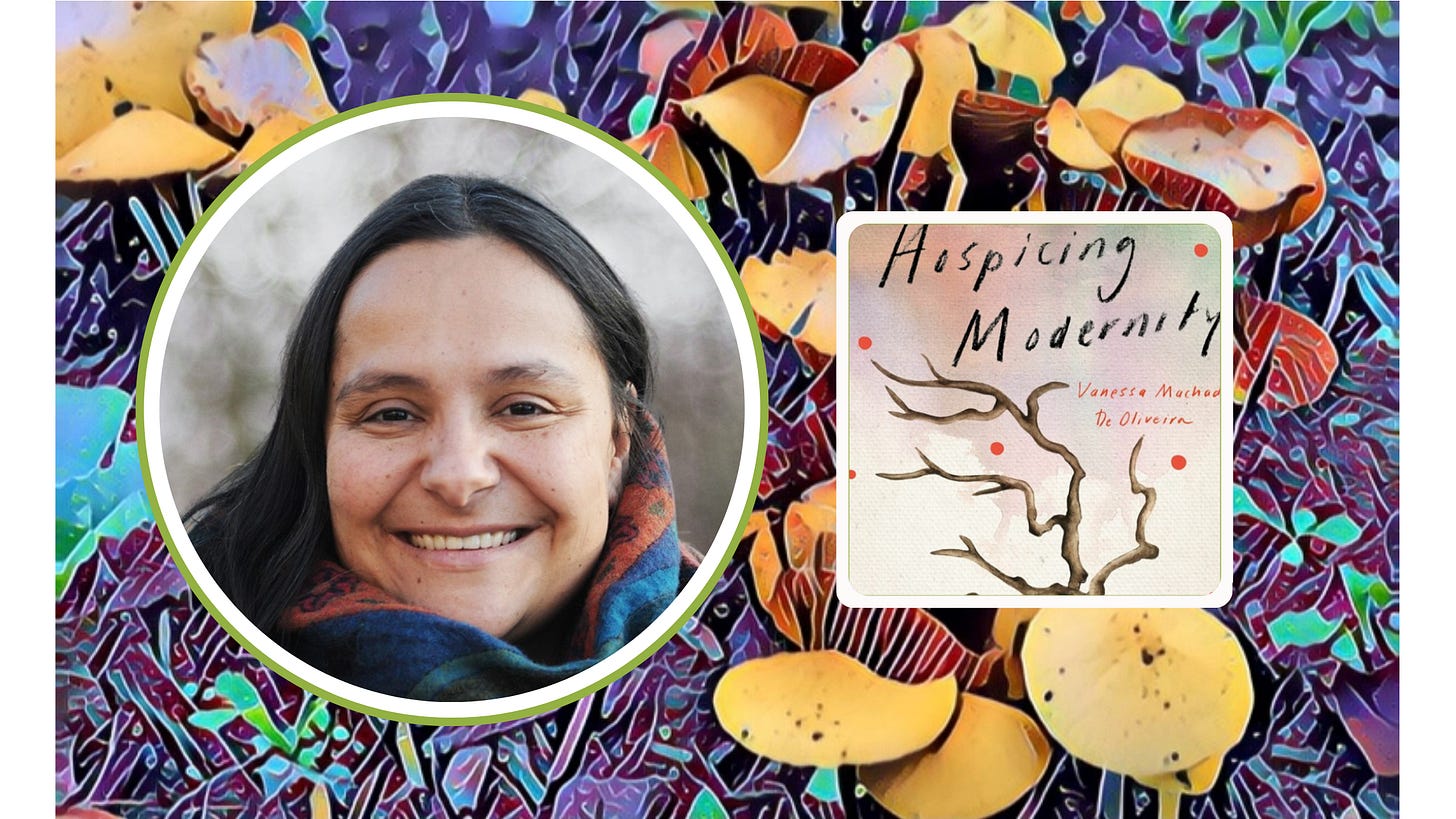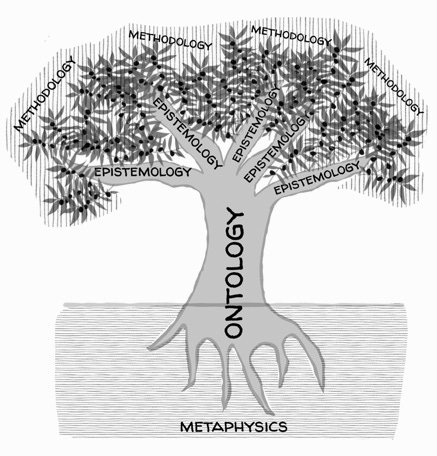Seeds of a Second Renaissance Issue 7 (Aug 2025) - Vanessa Machado de Oliveira on Hospicing Modernity
An introduction to "hospicing modernity": practising sobriety, discernment, and accountability for the end of the world as we know it. Plus, events & opportunities for inner-led change.
Welcome to Seeds of a Second Renaissance – a monthly newsletter for explorers of inner-led change towards radically wiser societies. For both seasoned travellers and those new to these shores, each edition offers a bite-sized exploration of keystone ideas, and thinkers whose work you may wish to know more deeply.
This time, a brief introduction to the much-respected work of Vanessa Machado de Oliveira and the Gesturing Towards Decolonial Futures Collective, on Hospicing Modernity. (It’s high time too: the sequel to this work, Outgrowing Modernity, was published last week.)
Below, you’ll also find curated events, jobs, and opportunities.
Hospicing modernity: Tending to the end of the world as we know it
What if we must learn to trust each other without guarantees? …
What if collective healing will be made possible precisely by facing—together—the end of the world as we know it?
~Vanessa Machado de Oliveira, Hospicing Modernity
As extractive systems wreak havoc on our inner and outer worlds, a growing number of voices warns: the cultural mindset of modernity has reached its limit. We can’t simply ‘fix’ the trouble we’re in from within the same logic that created it: unavoidably, industrialised societies are due a radical shift in our deepest ways of relating to the world.
Vanessa Machado de Oliveira (aka Vanessa Andreotti) is a Brazilian researcher and educator, and professor at the University of Victoria in Canada. In Hospicing Modernity (2021), she identifies this paradigm shift as a living process: laying to rest a complex entity manifested in our lives, enmeshed in a wider planetary metabolism. Our shared task is to witness what is dying within and around us, honour its gifts and “compost the shit” to clear space for new life.
Hospicing is care work; tending the dying with care and compassion, and supporting those left behind in the difficult process of letting go (p.xxii). Hospicing modernity is a process of accountability—recognising our own attachment to the promises and comforts of this hegemonic worldview, and the ways in which we’re incentivised to sustain it.
Existential investment
Despite the violence and unsustainability baked into the modern project, its reassuring promises shape our identities, desires, and even our sense of meaning (p.112).
Deep-seated fears manifest as desires, which ossify into assumed entitlement to particular ways of life; creating a psychological and cultural bind. Thus, while many of us understand modernity’s harmful side, we’re deeply conditioned by its comforts and securities; an unconscious line that we’re unwilling to cross. We might be willing to recycle or turn off the lights, but would we go for a few hours each day without electricity, or only buy fresh food without packaging?
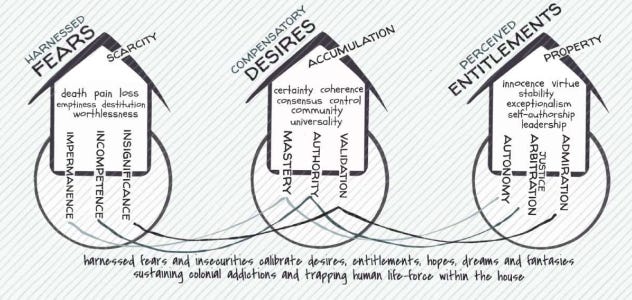
Denial
Machado de Oliveira identifies four “constitutive denials” (p.22) upon which modernity depends:
denial of systemic violence and complicity in harm: comfortable people prefer not to notice that our securities rest on the exploitation of marginalised humans, animals, and the planet.
denial of planetary limits: in pursuit of exponential growth and consumption, the modern mindset ignores the finite boundaries of planetary life.
denial of entanglement: modern reductivism rejects the fundamental interconnection of all things—including not only the pure and beautiful but also the painful, toxic, and ugly.
denial of the magnitude and complexity of our problems: we favour feel-good fixes that fail to address deeper causes of our predicament.
Shaped by this motivated forgetting, modernity persists within and through each of us: expressed in our beliefs, desires and choices.
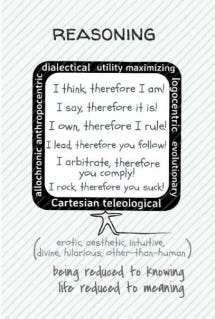
Ontological change
Therefore, the change that can clear a path for renewal will be ‘ontological’ — relating to our habits of being — in contrast to more shallow methodological change (to improve collective policies, practices, and strategies) and even epistemological change (concerning knowledge, imagination, and evaluation of legitimacy). Ontological change means examining our most fundamental notions about the nature of reality, self, experience, consciousness, time, space, change, life, and death – and pushing the bounds of what is intelligible, possible, relevant, and imaginable.
Clearing Space
Crucially, hospicing modernity involves tending to its decline — confronting its harms, learning, and disinvesting from it — without any guarantees or roadmap for what comes next, or even the promise of a better future. While we require openness towards alternative visions of values like progress, justice, care, and relationship, we aren’t looking to replace one system with another. Rather, space must be cleared for new narratives to emerge — which might not even be imaginable from a modern point of view.
In fact, the very need for a clear vision stems, Machado de Oliveira points out, from modern logic and fixation upon certainty:
we will only be able to imagine something genuinely different if we first become suspicious of what we desire and are able to imagine within modernity… In many ways, the only way out of the intellectual, affective, relational, and creative limits imposed by modernity is to intentionally pay more attention to modernity’s death rather than try to fix, replace, or escape it.
Rooted in practice
Hospicing Modernity offers itself as a book of spells — pedagogical experiments and reflective exercises to help readers expand our capacity to meet uncomfortable paradoxes, sit with messy truths, surrender arrogance, and reckon with our own complicity in harm without overwhelm. Through this learning we can better engage with the world and its crises, with sobriety, discernment, and accountability.
This teaching is addressed primarily to those of us living in contexts of “low-intensity struggle” — who largely enjoy the comforts modernity offers, who can choose whether to show up for change, and whose safety tends not to be fundamentally threatened. Nonetheless, nobody is quite “off the hook” — all are to some extent complicit in and victims of modernity’s harms. As such, whoever we are, we are invited to open our hearts:
to dig deeper, to relate wider, to engage in productive disillusionment, and to fall apart and together generatively, as we face the end of the world as we know it.
Explore the field of inner-led change…
A selection of events and opportunities recommended by readers, friends, and allies in the arena of inner-led regeneration.
👋 Help us to showcase the best opportunities and resources: please suggest items to include in the Events, Offers & Links or Jobs Board WhatsApp channels.
Upcoming Events
Second Renaissance Festival
📍Life Itself Farmhouse Hub, Thénac, France 📅 5-7 September 2025 💸 €175-800, inc. accommodation & food
“Join us … for an intimate gathering celebrating creativity and connection. Experience music, dance, storytelling, and self-organized offerings designed to inspire joy and co-creation during times of change. For this inaugural edition we’ll be keeping this small with no more than 20-30 participants.”
Transform Trauma Oxford: Healing Our Relational World
📍Oxford and online/virtual 📅 28-30 September 2025 💸 £360 (virtual ticket) £900 (in-person ticket). Scholarships available.
“Welcome to Europe’s largest trauma, mental health and wellbeing conference. … We are delighted to confirm Esther Perel, Richard Schwartz, Bessel van der Kolk and many more. These distinguished professionals will share groundbreaking insights, innovative strategies, and proven methodologies centred around this years theme of Healing Our Relational World.”
Twin Oaks Communities Conference
📍Twin Oaks, Louisa, Virginia, USA 📅 29 August-1 September 2025 💸 General admission: $160. Work exchange, youth, and one-day tickets also available.
“Join us … to network and learn about intentional communities of all kinds — co-housing, co-ops, communes, ecovillages, and more — at one of the best-known intentional communities in North America.”
Communities: Interdisciplinary Workshop
📍Hostaçov Chateau, near Prague, Czech Republic 📅 26-28 September 2025 💸 €100-250, inc. accommodation & meals
“An experimental gathering exploring how communities create knowledge, meaning, and transformation. … No individual, organization, or even nation can navigate today’s challenges alone. The future belongs to communities that can evolve together – but what makes some networks resilient while others fragment under pressure?”
Autumn Praxis Residency (Conscious Co-Living)
📍Life Itself Riverside Hub, Bergerac, France 📅 October to December 2025 💸 €1100-1300 per month, including room and food
“What does it mean to live well, together? How can our ways of being transform the world? Join us for the third Autumn Praxis Residency at the Life Itself Bergerac Hub: a 2.5-month-long container for contemplative, relational, and embodied practice in community. You’ll live together with others who are asking questions like these in their lives and work, and experience the frame of collective rhythms and practices for conscious community living which has been developed at the Hub over the past 5 years. Stay for just an orientation week, 1 month, or the full length of the residency.”
Jobs & Opportunities
Job: Human-Centered Transition Design Faculty Member
📍TU Delft (Delft University of Technology), Netherlands 📅 Application deadline: 15 September 2025
“The department [of] Human-Centered Design (HCD) within the faculty of Industrial Design Engineering (IDE) is recruiting an Academic Career Track (ACT) faculty member with expertise in Human-Centered Transition Design. … In this role you will provide leadership in three domains: (1) integrate Human-Centered Design knowledge and methods into Transition Design education in the IDE curriculum, (2) conduct rigorous research that critically reflects on and expands the role of design, particularly human-centered design knowledge, in shaping societal transitions, and (3) acting as ambassador for human-centered approaches to Transition Design.”
Job: Guardian & Residency Host in Southern France
📍Maison Marcelle, near Nice, France 📅 Start date: January 2026. Application deadline not stated.
“We are looking for two people who would like to live in a small, remote hamlet in the hills of Southern France (40 minutes from Nice) – and help shape this place with heart, hands and a sense of community. If you think of yourself as someone who feels at ease living in a remote setting, is good with the land, competent at fixing things around the house, and has a broad range of technical skills, we would love to hear from you! This is a position that requires a mix of manual labor and social skills, though they could be split between two people.”
Job: Lead Commuity Organiser at Act Build Change
📍UK-based 📅 Start date: November 2025. Application deadline: 26 August.
“This is a hands-on role for an experienced organiser who will lead key aspects of our community organising practice. You'll design and deliver training workshops, coach emerging organisers, and build meaningful relationships with both partner organisations and individual members to expand our movement.” Act Build Change is a “transformative organising school that makes community organising and collective care methods accessible to everyone who wants to end injustice.”
Free programme: Climate Adaptation for Creatives
📍UK and selected countries in wider Europe 📅 Programme begins: 22 September. Application deadline: 7 September 2025
“Developed in partnership between British Council and Black Mountains College, Climate Adaptation for Creatives is a free online programme exploring how the arts can meaningfully contribute to climate and environmental action. Through this programme, you'll reflect on the role of creativity in responding to today’s environmental challenges and connect with others across the UK and Wider Europe working at the intersection of art and climate.”
Call for papers: “Intentional Community Resilience in an Age of Uncertainty”
📍Lebensgarten Ecovillage, Steyerberg, Germany 📅 Conference: 10-12 July 2026. Proposal submission deadline: 1 November 2025
“The International Communal Studies Association (ICSA) invites scholars, practitioners, and theorists to participate in our upcoming conference, “Intentional Community Resilience in an Age of Uncertainty” that will occur at Lebensgarten Ecovillage, Steyerberg, Germany, on July 10-12, 2026. This conference will explore how [intentional] communities cultivate resilience in the face of pressing contemporary challenges and offer lessons to the broader society for effective social change.”
Second Renaissance
*“Second Renaissance” is one way of framing current times as a period of civilisational crisis and potential renewal – and of pointing to an ecosystem of people and organisations working to catalyse the emergence of a new, regenerative, cultural paradigm. If you recognise terms like metacrisis, Metamodern, Regenerative, Liminal Web, Game B, Integral, conscious evolution and so on, then you’re on familiar ground. Explore the core thesis and theory of change in more detail here.
🌱 Help us to plant seeds of a Second Renaissance. If you want to support the movement, you can:
💬 Share your thoughts in the comments section
🎁 Share this newsletter with a friend
💸 Become a paid subscriber
Finally, we leave you with some —
Art to nourish the soul…
This month, a series of works by Jeanne Simmons which portray both the resilience and delicateness of elements of nature — and express love for, and interconnectedness with, the natural world.
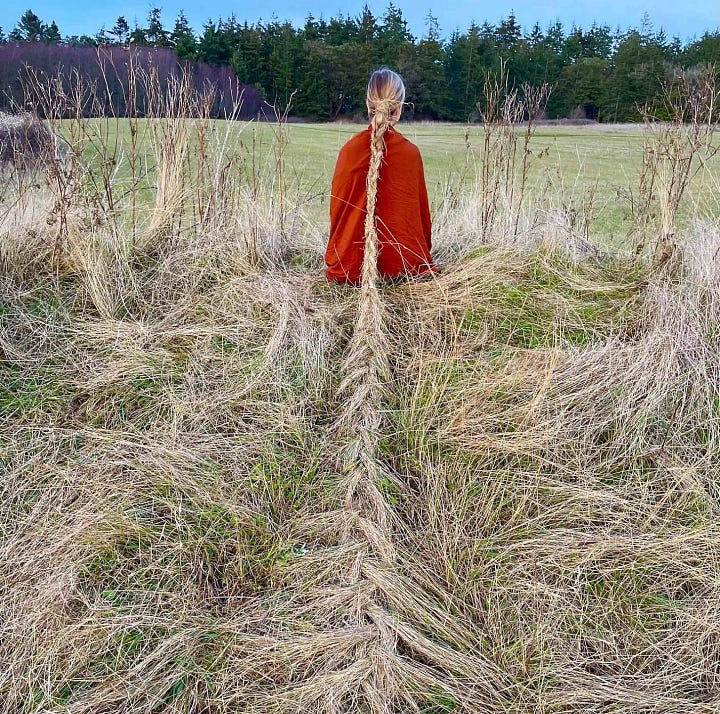
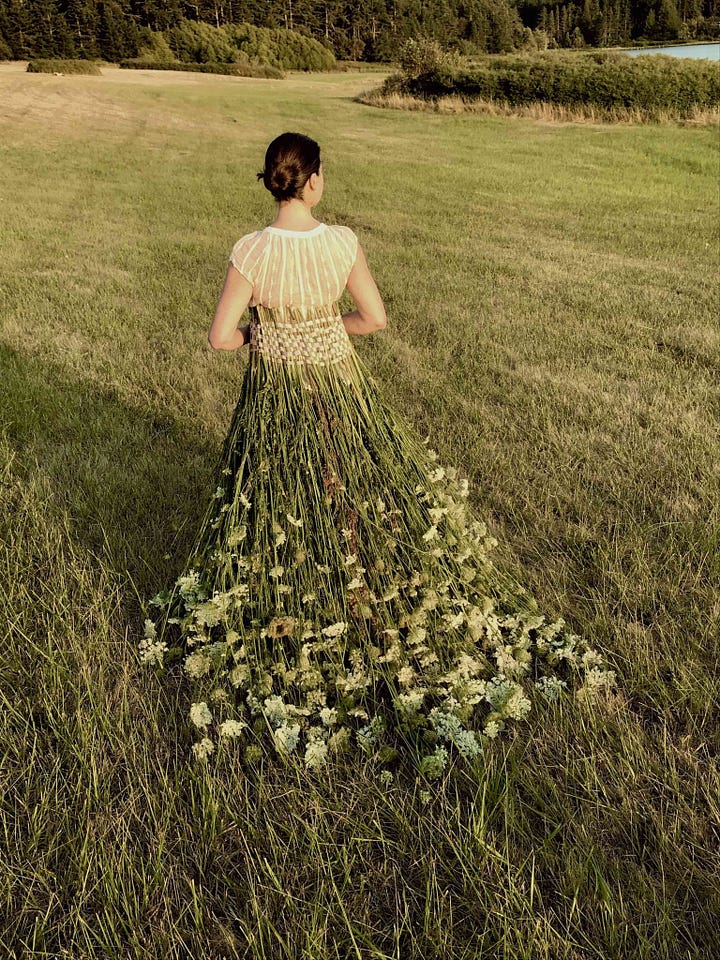
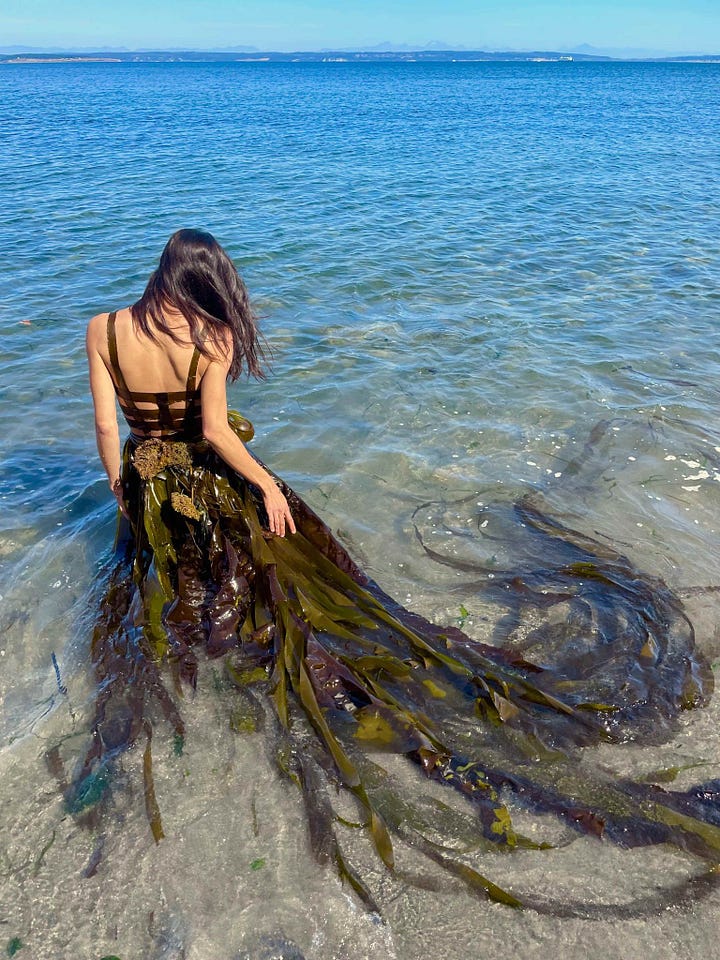
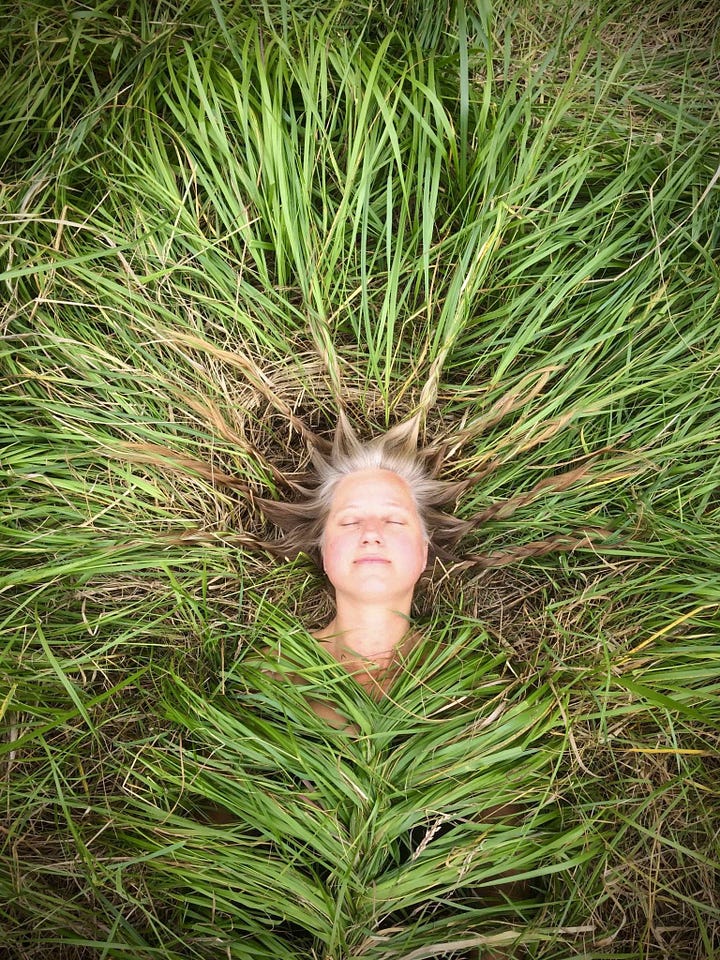
In both “Grass Cocoon” and “Extensions” my model, Nicole, could not walk away from her situation. She was literally bound to the Earth. She was also profoundly at peace with her condition. We cannot escape our relationship with the natural world. There can be no “us” without “it”.
~ Jeanne Simmons
To see the full images and artist commentary, see ‘Rupture and Reweaving: A Gallery on Gratitude and Loss’, published in the latest issue of Kosmos.
Thank you for reading the seventh issue of Seeds of a Second Renaissance.



